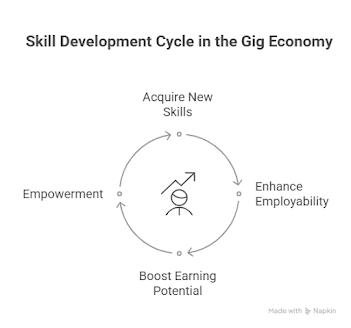Q.10 Examine the role of ‘Gig Economy’ in the process
of empowerment of women in India.
Introduction
The gig economy, characterised by short-term contracts or
freelance work, has emerged as a significant force in India's labour market.
Its impact on women's empowerment is multifaceted, presenting both
opportunities and challenges.
Opportunities Provided by the Gig Economy
- Flexibility and Work-Life
Balance: The
gig economy offers flexible work hours and location independence, enabling
women to balance their domestic responsibilities with their careers.
- Economic Independence: By
providing opportunities for income generation, the gig economy empowers
women financially. It allows them to contribute to household income and
make independent decisions.
- Access to Employment: It
provides a platform for them to showcase their skills and build a career.
- Skill Development: Many
gig jobs require specific skills, prompting women to acquire new
competencies. This skill development can enhance their employability and
earning potential.
Challenges and Concerns
- Job Insecurity and Income
Instability:
Gig workers, including women, often lack job security and face income
fluctuations. This can lead to financial instability and difficulty in
planning for the future.
- Lack of Social Security
Benefits: Most gig workers are not
entitled to social security benefits like health insurance, provident
fund, or maternity leave, which are crucial for women's well-being.
- Gender Pay Gap: While
the gig economy offers opportunities, it does not guarantee equal pay.
Women gig workers may face gender-based wage discrimination.
- Work-Life Balance
Challenges: Despite the
potential for work-life balance, the demanding nature of gig work can
sometimes lead to increased stress and burnout for women.
Conclusion
The gig economy presents both opportunities and challenges for
women's empowerment in India. A supportive policy environment, coupled with
skill development programs and access to technology, can help maximise the
benefits of the gig economy for women









No comments:
Post a Comment